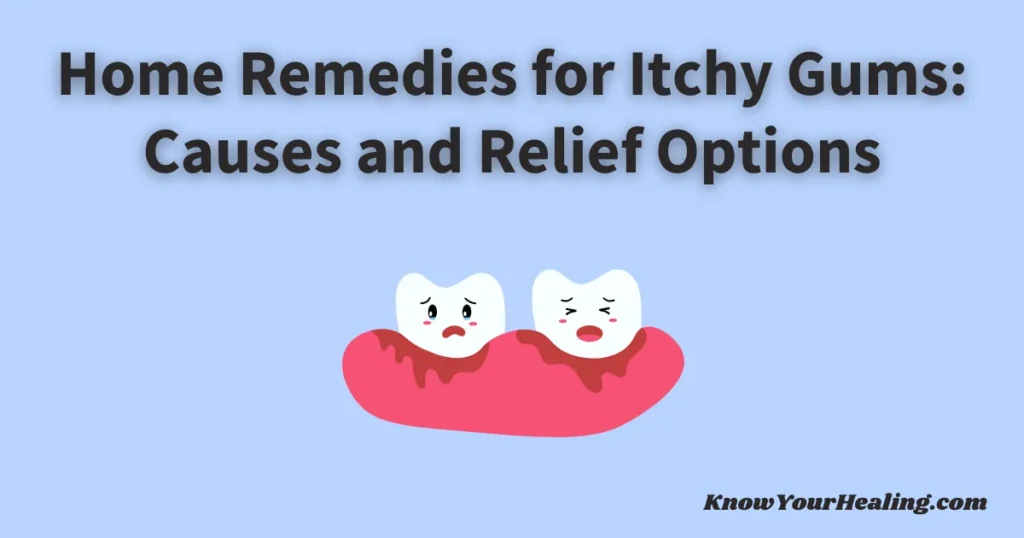Home remedies for itchy gums offer comfort and relief from a common yet annoying problem. Many individuals experience this discomfort without knowing the causes or how to alleviate it.
This article explores various solutions to ease the itch and prevent recurring. Solutions include proper dental hygiene and natural remedies like saltwater rinses.
Many people find relief through good oral care practices. Brushing and flossing regularly are key to maintaining gum health, while an antibacterial mouthwash can help reduce irritation and prevent infections.
Rinsing with a simple saltwater solution is an effective home remedy that soothes itchy gums and fights bacteria.
Understanding the causes of itchy gums, such as gum disease or allergic reactions, is essential in finding the proper treatment.
You can make informed choices for healthier gums by exploring conventional and home remedies.
This article provides a comprehensive guide to the causes and relief options available, helping alleviate this persistent issue.
Understanding Itchy Gums: Causes and Symptoms
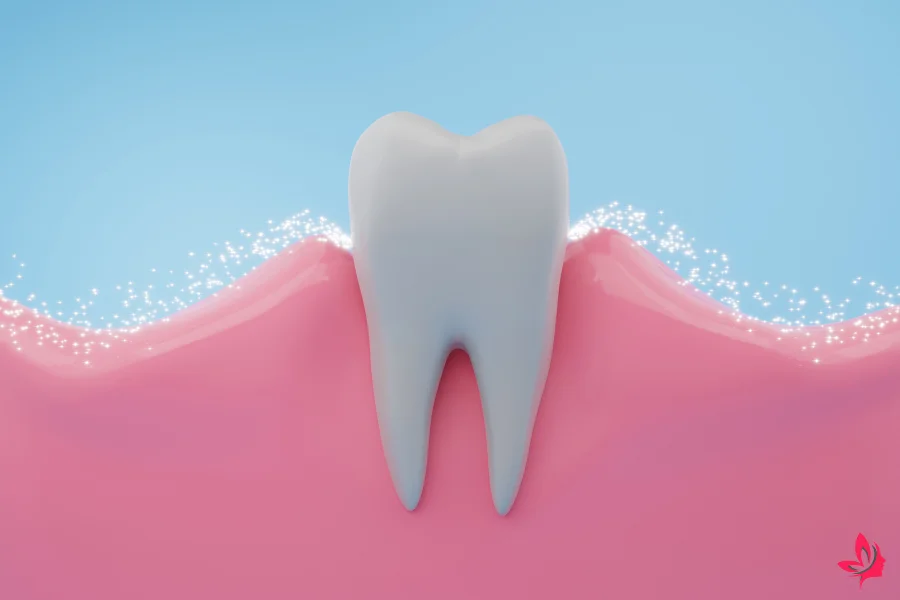
Itchy gums can be quite uncomfortable and can arise from various factors. Recognizing these causes and symptoms is vital for maintaining good oral health and finding appropriate relief.
What Causes Itchy Gums?
Itchy gums often result from several factors, including poor oral hygiene, which leads to plaque buildup and gum disease. This can cause gum irritation and inflammation.
Hormonal changes, especially during pregnancy, can also increase gum sensitivity. Allergies, including oral allergy syndrome or seasonal allergies like hay fever, might result in an itchy sensation in the gums.
Medical conditions such as dry mouth and viral or bacterial infections can further contribute to this discomfort. Some people may also experience itchy gums due to food allergies or the presence of food debris.
Maintaining good oral hygiene by regular brushing and flossing can help prevent these issues. Additionally, using dental products like fluoride toothpaste can offer some protection.
Symptoms of Itchy Gums
The primary symptom of itchy gums is a naturally varying itching sensation.
This is often accompanied by gum redness, swelling, and tenderness. Bleeding while brushing or flossing can also occur, indicating gum issues such as the early stage of gum disease.
The symptoms may be sporadic or persistent, depending on the root cause.
Sometimes, itchy gums might coincide with other oral symptoms, such as a tingling sensation in the mouth or tooth pain. Changes in hormone levels can exacerbate these symptoms, particularly in women during certain life stages.
Home Remedies for Itchy Gums
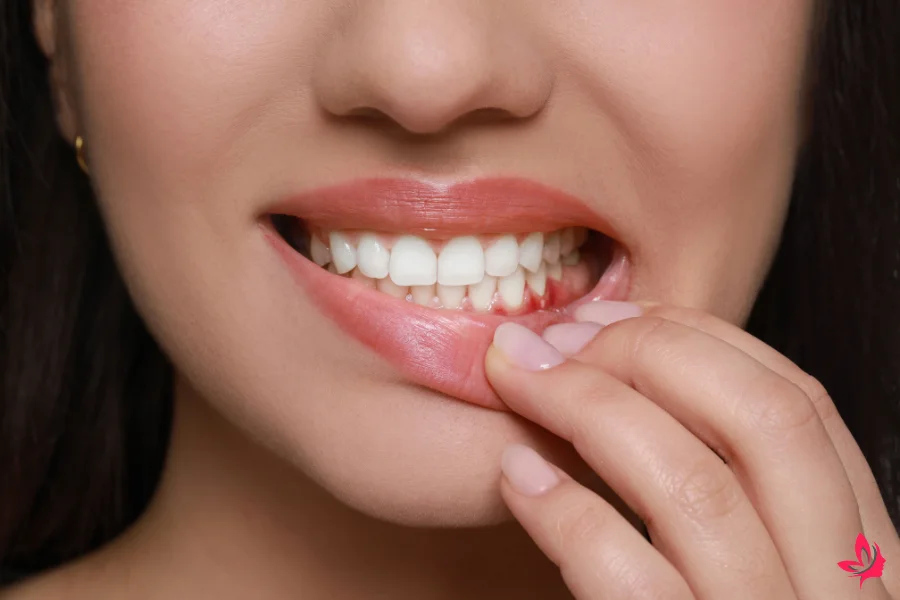
Home remedies offer effective strategies to soothe itchy gums. These remedies focus on reducing gum irritation and promoting dental health. They address common issues like food particles and gum sensitivity.
Simple Home Remedies to Try
Saltwater rinse is one of the most recommended solutions. Mixing a teaspoon of salt into a glass of warm water and rinsing twice daily can help reduce inflammation and cleanse the mouth. This method aids in removing food debris and soothing the delicate tissue around the gums.
A cold compress, like ice cubes wrapped in a clean cloth, offers temporary relief by numbing the itchy sensation and reducing swelling. It’s particularly effective after dental procedures like a tooth extraction.
Maintaining good oral hygiene is crucial. Regular brushing and flossing remove the sticky film of plaque that can irritate. People should brush twice and floss daily to prevent plaque buildup and possible infections.
Dietary Changes for Gum Health
Specific dietary changes can significantly enhance gum health. Consuming crunchy, raw fruits and vegetables can help clean teeth and gums naturally.
This also encourages the production of enough saliva, essential for neutralizing acids and washing away food particles.
Staying hydrated by drinking plenty of water helps keep the mouth moist, preventing dry mouth and its itchy symptoms. Limiting sugary foods and drinks is also vital, as sugar can contribute to tooth decay and inflame the gum line.
Additionally, for individuals experiencing seasonal allergies or oral allergy syndrome, identifying and avoiding trigger foods can prevent mild allergic reactions that cause an itchy mouth.
Natural Remedies for Immediate Relief

Home remedies can be effective in easing the discomfort of itchy gums. Addressing inflammation and gum irritation helps improve gum health and maintain proper dental hygiene.
Saltwater Rinse
A saltwater rinse is a gentle and effective remedy for itchy gums. Mixing a teaspoon of salt in a glass of warm water creates a soothing solution that helps reduce inflammation and cleanses the delicate tissue of the gums.
Saltwater reduces bacterial infections and food debris, which can lead to gum irritation and plaque buildup. Gargling the solution for about 30 seconds can relieve the itchy sensation and help maintain good oral hygiene.
This rinse should be used regularly for best results. It not only offers immediate relief but also helps prevent further gum issues, such as periodontal disease.
Baking Soda Application
Baking soda is another useful option for soothing itchy gums. Its mild antiseptic properties make it effective in addressing gum irritation and inflammation.
Mixing a pinch of baking soda with enough water to form a paste can neutralize acids contributing to tooth decay and gingivitis, the first stage of gum disease.
Applying this paste gently on the gum line can help remove the sticky film that often harbors bacteria. This method is beneficial, especially if the itching is due to poor oral hygiene or food particles trapped in the gums. Be sure to rinse thoroughly to ensure all residues are removed.
Aloe Vera Gel
Aloe vera gel is known for its natural healing properties and is effective in relieving itchy gums.
The gel can be applied directly to the gum tissue to soothe the itchy mouth and reduce gum sensitivity. Aloe vera has natural anti-inflammatory components, which help calm gum irritation caused by bacterial or viral infections.
This remedy benefits individuals experiencing gum issues due to hormonal changes or a dry mouth.
Good Oral Hygiene Practices

Good oral hygiene is essential for maintaining healthy gums and preventing issues such as itchy gums. Many home remedies can complement daily routines, but consistent habits are crucial for long-lasting results.
Effective Brushing Techniques
Regular brushing helps remove food particles and plaque buildup, reducing gum inflammation and irritation.
The best way to brush is using a soft-bristled toothbrush to avoid damaging delicate tissue. Fluoride toothpaste should be used twice daily, and each session should last at least two minutes.
Brushing at a 45-degree angle to the gum line removes debris while preventing tooth decay, a common cause of itchy teeth.
Plaque buildup can lead to gum conditions like gingivitis, so thorough brushing is essential.
The Role of Flossing
Flossing daily is vital in removing sticky film and food debris stuck between teeth, which toothbrushes can’t reach.
Flossing prevents plaque from hardening into tartar, a significant contributor to gingivitis and periodontal disease. It helps maintain gum health by controlling inflammation and reducing the risk of tooth loss.
For those experiencing gum sensitivity, using gentle, waxed floss can avoid further irritation.
Combining flossing with a saltwater rinse can temporarily relieve itchy gums and help maintain overall dental health.
Preventive Measures
Preventing gum issues involves more than brushing and flossing. Regular dental check-ups and professional cleaning play crucial roles in maintaining gum health.
Staying hydrated helps produce enough saliva to naturally wash away bacteria, reducing the risk of gum infections.
Avoiding tobacco products and maintaining a healthy diet can also help prevent gum irritation. Consuming plenty of water is essential to avoid dry mouth, which can exacerbate symptoms of itchy gums and contribute to further oral health issues.
Herbal Treatments and Essential Oils
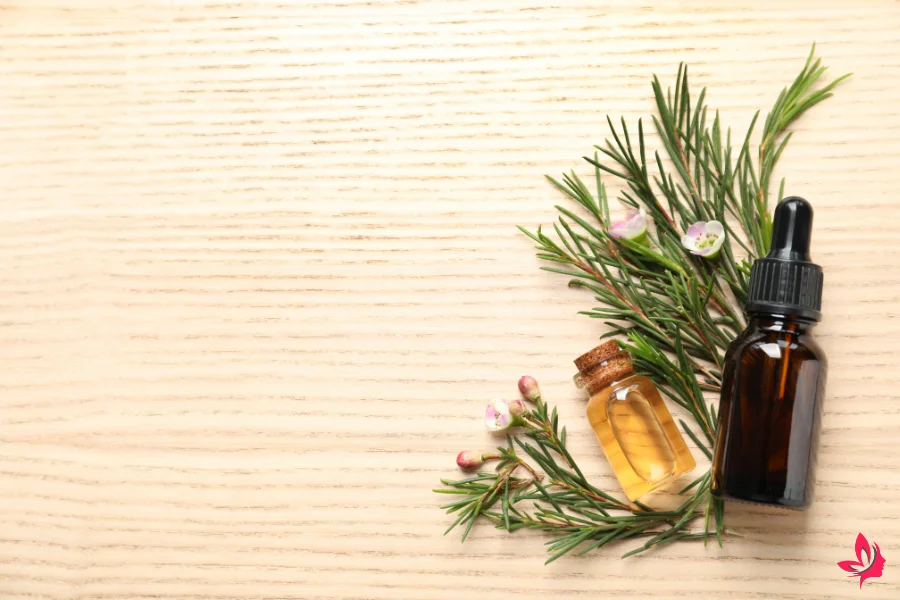
Herbal treatments and essential oils provide natural solutions for itchy gums. These treatments, such as peppermint oil and chamomile tea, help soothe gum irritation and promote dental health. They can be beneficial in cases caused by gum sensitivity or plaque buildup.
Peppermint Oil Usage
Peppermint oil is a popular remedy for gum issues due to its soothing and antiseptic properties. It helps reduce gum irritation and can provide relief from discomfort.
Users can apply a few drops of peppermint oil to a clean cloth and gently massage the affected gum area. This can help enhance blood flow and maintain healthy gum tissue.
Its cooling sensation also aids in reducing inflammation, which can be a root cause of itchy gums.
While peppermint oil can offer temporary relief, it is essential to maintain good dental hygiene and seek professional dental care for persistent symptoms of itchy gums. Avoid using peppermint oil if allergic reactions occur.
Tea Tree Oil Application
Tea tree oil is another essential oil with powerful antibacterial properties that can combat gum infections. It is often recommended for plaque buildup and maintaining healthy gums.
Mix a few drops of tea tree oil with a glass of warm water. Swish the mixture in the mouth for about 30 seconds and then spit it out.
This practice helps reduce bacteria accumulation, which can lead to gum irritation and an itchy sensation.
Never swallowing tea tree oil is vital, as it can be toxic when ingested. Regular use as part of a dental hygiene routine can help manage the symptoms of itchy gums.
When to Seek Professional Help
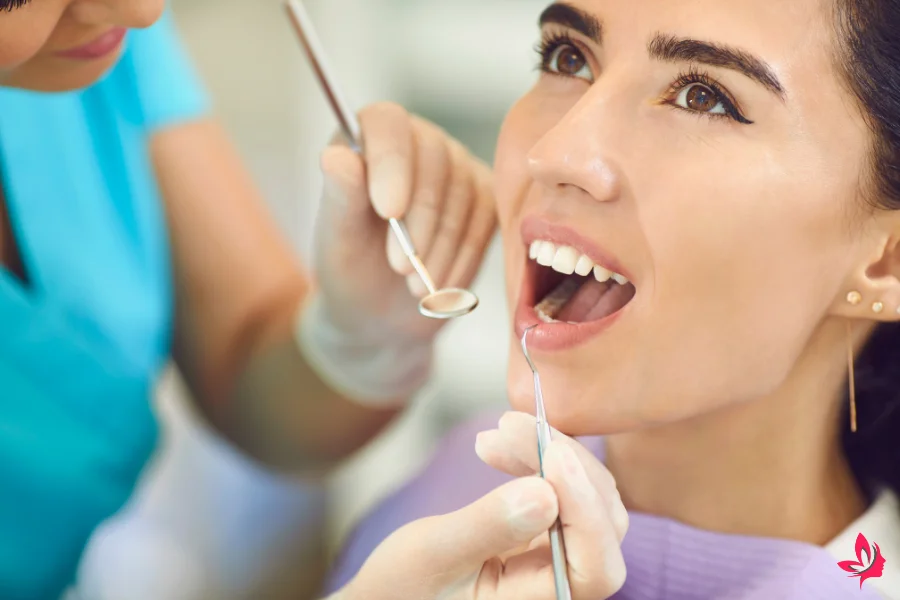
Sure signs suggest it’s time to consult a dentist when dealing with itchy gums. Recognizing severe symptoms and understanding available treatments could prevent complications.
Identifying Severe Gum Issues
Persistent gum issues suggest it might be time for professional attention.
Symptoms like constant itchiness, swelling, or bleeding around the gum line can indicate underlying problems, such as gingivitis, the first stage of gum disease.
Other concerning signs include pain while chewing or sensitivity to temperature-related foods. Hormonal changes or dry mouth can exacerbate these symptoms.
A dental check-up is crucial if these occur, as untreated gum problems might lead to tooth loss or more complex medical conditions.
Professionals can assess the cause of itchy gums and determine if other factors, like poor oral hygiene or allergic reactions, contribute to symptoms.
Professional Treatments Available
Dentists offer various treatments to address severe gum issues.
Professional cleaning, such as scaling and root planing, removes plaque buildup, which is crucial for maintaining good oral health.
A root canal treatment may be necessary if an infection or abscess is present.
For itchy gums caused by allergies, professionals might suggest antihistamines.
Dentists may also recommend fluoride toothpaste to strengthen enamel.
Understanding how appropriate treatment and regular dental check-ups can drastically improve gum health and prevent further problems is important.
Other recommendations might include changes in daily habits, such as increasing water intake to ensure enough saliva to reduce future gum irritation and maintain overall dental health.
Addressing Specific Conditions Related to Itchy Gums

Itchy gums often result from specific conditions, such as allergies, medical issues, such as gum disease, or hormonal changes. Addressing the root cause can prevent discomfort and maintain healthy gums.
Allergies and Gum Sensitivity
Seasonal allergies, like hay fever or oral allergy syndrome, can lead to itchy gums.
They create an itching sensation due to the inflammation of delicate gum tissue. Foods triggering mild allergic reactions can also contribute to this irritation.
To combat allergy-induced gum sensitivity, a saltwater rinse is effective in soothing the gum line.
Mix a teaspoon of salt in warm water and rinse to reduce inflammation.
Using ice cubes can provide temporary relief by numbing the itchy mouth sensation.
Maintaining good oral hygiene through regular brushing and flossing helps remove any trapped food particles that might exacerbate irritation.
Other Medical Conditions
Gum disease, the first stage known as gingivitis, often presents as itchy gums.
Plaque buildup along the gum line can lead to inflammation and irritation. The best way to address this is to ensure regular dental check-ups and professional cleanings.
A professional can offer scaling and root planing to remove plaque and tartar.
Hormonal changes, such as those occurring during pregnancy, can increase gum sensitivity.
A dry mouth can also result from these changes, reducing saliva production and leading to gum irritation.
To alleviate this, drinking plenty of water can help maintain enough saliva, while a healthy diet supports overall dental health.
For those with underlying medical conditions causing gum issues, determining the appropriate treatment with a healthcare professional is crucial for itchy gums relief.
Final Thoughts
Home remedies for itchy gums can be quite effective in providing relief.
Regular brushing and flossing are key to maintaining good oral health. A thorough dental routine can help minimize irritation.
Saltwater rinses can also be beneficial. Swishing a lukewarm saltwater solution in the mouth can soothe itching and reduce inflammation. This is an easy and affordable practice that anyone can do at home.
Either way, staying hydrated is important. Drinking plenty of water helps keep the mouth moist, which might prevent gum irritation.
Additionally, chewing sugar-free gum can promote saliva production, offering relief.
For those seeking immediate relief, applying a cold compress to the outside of the cheek can reduce swelling and numb the itching sensation.
Key Takeaways:
- Brush and floss regularly.
- Use a lukewarm saltwater rinse.
- Stay hydrated and consider sugar-free gum.
- Apply cold compresses for quick relief.
Home remedies are a simple way to care for the gums, but a dental professional should evaluate persistent symptoms.
Frequently Asked Questions
Itchy gums can be caused by various issues, such as allergies, dental plaque, or vitamin deficiencies. Addressing these problems with home remedies and proper care can often relieve and prevent further irritation.
How to stop your gums from itching?
Regular dental hygiene is essential. Brushing, flossing, and using an antibacterial mouthwash can help alleviate itching.
A saltwater rinse can also soothe gums and reduce irritation; mix one teaspoon of salt with warm water and swish it around the mouth.
How do you heal irritated gums fast?
Using a saltwater rinse can quickly calm irritated gums. Drinking plenty of water can also help as it maintains oral moisture and flushes out bacteria.
For further relief, applying a cold compress can reduce swelling and discomfort while promoting healing.
Why do my gums feel like they are tickling?
Gums may feel tickling due to plaque buildup or food particles. Allergic reactions or new dental appliances can also contribute to this sensation.
If it persists, consulting a dentist is recommended to identify the cause and get proper treatment.
How long do itchy gums last?
The duration of itchy gums can vary based on the underlying cause.
If related to minor irritation or allergies, it typically subsides with proper care in a few days. Ongoing or severe itching may require a dental evaluation to determine a more precise solution.
What is a home remedy for itchy teeth?
A common home remedy for itchy teeth includes rinsing the mouth with a saltwater solution.
Brushing with a soft-bristled toothbrush also helps remove plaque buildup. Increasing water intake can keep the mouth moist, reducing itching.
Can gum irritation go away on its own?
Minor gum irritation might resolve independently with good oral hygiene and gentle care.
If the irritation is caused by temporary causes, like food particles, it typically improves with regular brushing and flossing. However, persistent irritation should be evaluated by a dental professional.
What vitamin deficiency causes itchy gums?
A deficiency in vitamin C can lead to gum problems such as swelling and itching.
Ensuring a diet rich in fruits and vegetables like oranges and leafy greens can help meet vitamin C needs. If a deficiency is suspected, consulting a healthcare provider can provide guidance.
How to stop an itchy mouth?
To stop an itchy mouth, maintain thorough oral hygiene and avoid irritants. Drinking water regularly can help keep the mouth hydrated.
Over-the-counter antihistamines may be helpful if allergies are the cause of the itch.
Does itchy gums mean healing?
Itchy gums do not necessarily mean healing.
They could indicate irritation or the presence of plaque. If unsure, consult a dentist to determine the cause and appropriate treatment.
How to cure gum disease without a dentist?
While maintaining good oral hygiene is crucial, completely curing gum disease without a dentist is challenging.
Home care, such as regular brushing, flossing, and antibacterial mouthwash, can help manage mild cases. Severe gum disease requires professional dental treatment to prevent progression.

